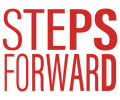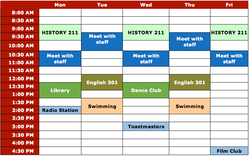Student Life |
Academics: |
|
|
Students enroll in two courses a semester in the program of study that they choose. Student responsibilities include:
Students are enrolled in courses as participatory auditors, this allows professors and inclusion facilitators to modify course work as much or as little as needed for the student to engage with the course. At the end of 4 or 5 years of study students receive a certificate of completion and attend convocation with their department of study. ** Students are responsible for paying tuition and purchasing textbooks. The cost of tuition is different at each campus, the local inclusion facilitators can let you know the approximate cost per term ** |
|
|
Student Schedule
(click on schedule to enlarge) |
|
|
Campus Life: |
|
Students are supported to get involved in campus life based on their interests. Students join clubs and course unions, make friends with similar interests, attend student parties and use the gym and recreation facilities on their campus.
Support is provided in invisible and individualized ways to allow students to make decisions about what they want to explore on campus. |
|
|
Career Development |
|
|
Career development is a key part of Post-Secondary Education. Over 4 or 5 years of study, students have a variety of opportunities to figure out what they are interested in and how to build towards a career in their field of interest. During the summer (April - August) students are supported to find paid work, internships, training, networking and volunteer opportunities that relate to their career dreams.
|
|
|
What a typical day can look like:
|
|
Morning:
Afternoon:
|
Deciding What to Study and Course Selection |
|
|
STEPS Forward, through the BC-Initiative for Inclusive Post Secondary Education (BC-IPSE), supports students with developmental disabilities across BC. We support students who have a wide range of abilities.
STEPS Forward has a policy of ensuring that, on each campus, at least one student with significant and complex challenges has an opportunity to continue their studies after high school. Many students have big dreams when they start going to college or university. They plan on becoming doctors, lawyers, scientists, politicians, teachers, lab technicians, etc. The list goes on and on. Not all students will end up in their fantasy career but having that dream will put them closer to the future life they envision for themselves. When a applicant tells us they want to be a neurosurgeon, orchestra conductor, or broadcaster on major TV sports channel we are thrilled. They are not the only students starting their studies with big dreams. And like many other students they starting down one path they find they end up exploring other interesting opportunities that were not part of their original plan. The important thing is to keep them dreaming big and broadly; to keep them on that bigger than life pathway to their future. Facilitators will work with them, and you, to support them to go as far as they can in becoming successful students. Ideas for what to study:
|
Socializing on Campus |
|
This is a significant part of campus engagement and student development. Students connect with people who have similar passions and interests. For many students the people they get to know through these extra-curricular activities, sports, and social occasions evolve into life long connections leading to new activities, communities, potential employment, and friendships.
Frequently these activities will happen in the afternoon, evening, or weekends. Many families struggle with finding the balance of supporting their family member to participate in these activities and how this affects the schedules of others in the family or household. It is extremely important for families to have a willingness to explore how to make it possible to say yes to supporting engagement with these activities, and to work with the inclusion facilitators to make it possible. |
Career Choices and Post Graduation |
|
Colleges and Universities are hubs of opportunities and support services explicitly geared towards students' academic, social, emotional and career success. The TMU University Student Affairs website provides a snapshot of the all encompassing support they provide to their students and which is typical of all campuses.
How the alumni will engage in life, and what activities, interests and careers they will have, will look different for each individual as will how that is supported. For some alumni support will be minimal and infrequent, while others may require more support to consolidate the inclusive life they started to lay down the foundation for at college/university. Today, we have the expectation that people with developmental disabilities will find gainful employment. While historically that has not been the case, today we are redefining what the term gainful means. Previously "gainful employment" referred to individual working to increase their personal wealth or resources. More and more it is coming to mean where one is not only paid for the work they do, but also a place where they find community and are valued for their contributions. Adults with developmental disabilities entering the workforce, are generally expected to work in limited entry level positions with no hope of advancement. Students supported to live an inclusion, coherent, life are challenging those assumptions and seeking positions which are pathways to developing a career, community and advancement. "Mom, I don't need to hire someone to be my friend so I can go jogging! I can find my own friends to do that like I did at UVic."The role of the inclusion facilitator is to support alumni and families to:
Where on-going support may be required, inclusion facilitators have experience in working with families to hire and train their personal inclusion support staff. |
Application Process |

